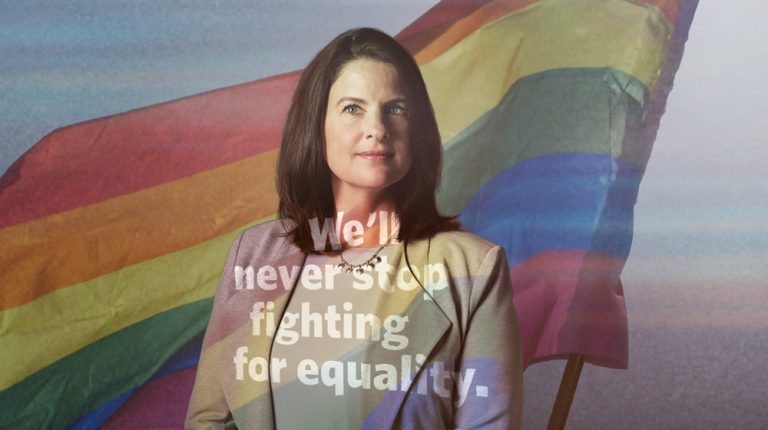

Ever since she was a teenager, Dr. Toni Schmader has been trying to figure out why we treat each other as ‘us’ and ‘them’. As a professor and Canada Research Chair in Social Psychology, she’s been diligently working to determine how educating people about their implicit biases can make a difference in changing the culture of an organization. The end goal? Designed and tested interventions that will counteract the negative effects that biases can have on how we treat each other.
When dealing with our world’s most difficult problems, there are two choices: Either giving up and admitting defeat, or believing in our potential to shape a different future. That choice is at the heart of UBC’s latest national advertising campaign, called ‘The potential is yours.’
Meet Dr. Toni Schmader, Professor and Canada Research Chair in Social Psychology and Director of the Engendering Success in STEM Consortium, who is featured in the campaign.
WHAT ARE YOU CURRENTLY RESEARCHING OR WORKING ON?
My research examines how negative stereotypes constrain the choices people make and what they can achieve. We use a combination of experimental and survey methods carried out both in the lab and in the field. In our current work, we examine how gender stereotypes and implicit biases affect women’s abilities to feel included and excel in Science, Technology, Engineering, and Math (STEM). We are also working together with educational and industry partners to design and test interventions that will counteract the negative effects that biases can have on how we treat each other.
“I’ve always been interested in understanding why people so readily sort the world into ‘us’ and ‘them’ and then assume that these groups are more different than they are similar.”
WHAT DREW YOU TO YOUR FIELD OF STUDY?
I’ve always been interested in understanding why people so readily sort the world into ‘us’ and ‘them’ and then assume that these groups are more different than they are similar. As a teenager, I developed an interest in how the surrounding context can create disparities in what people can achieve. My liberal arts college background taught me that social psychology provides creative and quantitative methods to isolate how situations shape our perceptions of others and ourselves. Experiences working with women in STEM drew me deeper into research on the nature of gender bias and how to reduce its effects.
WHAT ARE SOME CHALLENGES RELATED TO YOUR FIELD THAT YOU’RE HOPING TO HELP SOLVE?
Many companies have begun requiring their employees to learn about unconscious biases, but there’s very little research aimed at evaluating the effectiveness of this kind of training. Currently, we are trying to test if and when educating people about bias can make a difference in changing the culture of an organization by catalyzing a change in norms through social networks. To carry out this research, we need to coordinate with companies across North America to test these kinds of interventions and track their effects over time. Getting that kind of access and buy-in to the research question is essential, but definitely a challenge.
HOW DOES UBC SUPPORT YOU IN REALIZING YOUR GREATEST POTENTIAL?
UBC is an exciting place to work. Not only am I surrounded by inspiring colleagues, but the calibre of the programs offered attracts incredible graduate students and undergraduates eager to work together on research.
Connections to UBC:
This Q&A was originally featured on ubc.ca


